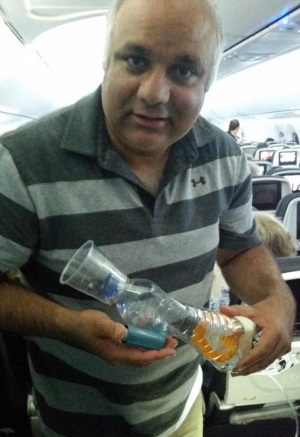by
Thomas Dworetzky, Contributing Reporter | September 29, 2015

Dr Khurshid Guru / Twitter
The asthmatic toddler was having a hard time breathing and without his medications — trapped on a transatlantic flight from Spain to the U.S.
That's when Dr. Khurshid Guru, director of Robotic Surgery at the Roswell Park Cancer Institute, sprang into action, fashioning a makeshift nebulizer to deliver oxygen and asthma meds to the toddler, saving his life.
The New York doctor made his "MacGyver" device with an odd assortment of items he scrounged aboard the Air Canada flight: a plastic water bottle, a cup, oxygen mask and a small oxygen tank.



Ad Statistics
Times Displayed: 137004
Times Visited: 7945 MIT labs, experts in Multi-Vendor component level repair of: MRI Coils, RF amplifiers, Gradient Amplifiers Contrast Media Injectors. System repairs, sub-assembly repairs, component level repairs, refurbish/calibrate. info@mitlabsusa.com/+1 (305) 470-8013
The 2-year-old boy was having trouble breathing and his parents told the physician they had put his asthma medication in checked luggage,
according to ABC news.
"The child had developed a cold," Guru told the station. "We were three or four hours into the flight. I think the cold and popping of the ears and crying... He got worse."
As the young boy's oxygen level dropped dangerously -- 87 or 88 percent -- Guru faced a dilemma, there was only an adult inhaler on the plane. That's when the robotic expert fashioned his improvised device, which delivered lifesaving oxygen and medication to the child.
To create the nebulizer, the surgeon cut up a water bottle and added oxygen to one end and the adult inhaler through a small hole in the bottle. That way the oxygen and medication could be delivered through the bottle's opening directly to the child.
"As the bottle went near to the child's face, he pushed it away," Guru reported to ABC. "I got a water cup and made a hole in the bottle and focused it to his face... told [the parents] to keep it there. Within about half an hour and two treatments he was sounding much better," and his oxygen level was at 94 or 95 percent.
Guru's expertise with technology is far from limited to MacGyver-like exploits. He is a trained robotic surgeon with over 10,000 surgical console hours of experience who has performed over 1,500 procedures.
He performed one of the first robot-assisted radical cystectomies in New York, and has worked in development and evolution of oncologic safety and efficacy of minimally-invasive approaches to bladder cancer. His research has focused on the use of robotic surgery for urinary reconstruction.
Guru developed one of the first robotic surgical simulators, currently used in over 20 institutions across the globe and he now heads the International Robotic Cystectomy Consortium with over 55 surgeon members in over 20 countries.
Back to HCB News

